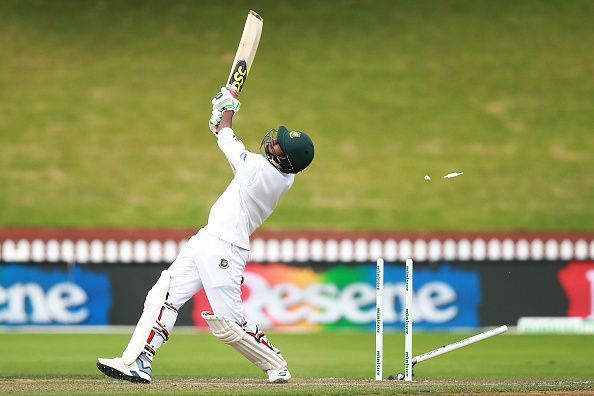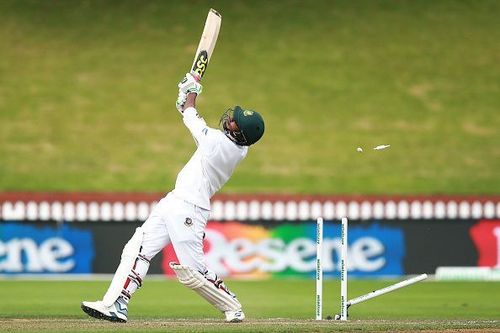
Opinion: It's time for Bangladesh to step up or completely step down from Test cricket

For the fourth night in a row, Hasan silently wept in the dead of the night. There was nothing anyone else in the room could do about that, except pretend that they were asleep and not awakened by the noise of his sadness.
Young Hasan was only 16 years of age but was now without his parents in a ruthless city far from home. He had only completed his 10th-grade exams in Comilla and had never been away from his mother’s adoration and father’s tough love his entire life.
He didn’t like studying and spent most of his time playing cricket – it was his passion. Ultimately, he decided to pursue his passion but that meant that he would have to travel to Dhaka, join an academy and stay there – away from his parents in a cruel city, something he was unprepared for.
But he was determined and despite some resistance from his parents, he made his way to Dhaka.
Also see – Ranji Trophypoints table
A boy who had just turned 16 came to a new city, away from his parents for the first time, and had to wake up before everyone else to leave for practice … the sadness flowed through his eyes.
And yet, he would march to training almost every day with big dreams in his heart.
This is the story of one Hasan. Just the one. If you take a trip to just a few academies in Dhaka, you will find countless Hasans there, far away from their parents in a strange city, living a life they never knew was possible.
In the best-case scenario, a few go on to represent the Bangladesh team. But the best-case scenario is a rarity; something that gives birth to countless dangerous dreams – of a successful life of stardom and glory.
Of false hopes. Of shattered dreams.
Some go back to their homes and start all over again if they are lucky, while others try to scrape out a living. And then there are the ones who become embroiled in a life of substance abuse after mingling with the wrong set of people.
This is just one side of the coin; the part which displays those that are able to leave their homes and head to Dhaka. There are also stories of some really talented individuals who could never pursue their dreams because they couldn’t make the jump to the capital for a plethora of reasons.
This brings us to the main question: why do children have to come to Dhaka to make a name for themselves in cricket?
Why can’t they stay in their own state, rise up the ranks and stake their claim for a spot in the Bangladesh cricket team?
The short answer is: they can’t.
Poor infrastructure and the need for a solution
The infrastructure outside Dhaka is just not good enough for the players to be considered for selection for the national team. In almost every Test-playing nation, players rise through the ranks from their respective states but in Bangladesh, a player has to go to Dhaka for better cricketing education and a better chance at making it to the national team.
As a result, despite having Test status for almost two decades now, Bangladesh hasn’t been able to produce a team capable of withstanding the pressure of the most grueling format of the game.
The two innings defeats against India were all but confirmed even before Bangladesh set foot on Indian soil as the Tigers simply didn’t have the players capable of challenging the Indians.
While almost everyone will look at the performances – or the lack thereof – of the players, the real problem lies far deeper. For far too long, the Bangladesh cricket team have mindlessly floated without proper planning and implementation.
The solution to this, however, is not to play more Test matches. In fact, if anything, the Tigers need to step down from Test cricket because the players keep making the same mistakes over and over again. This suggests that they are not really learning from their errors and that the problem runs deeper than that.
Indeed, the Tigers need to take a step back and understand that a strong first-class circuit is the crux of a good cricket team. However, the current set-up just doesn’t provide that.
Poor infrastructure in the other states, which includes lack of facilities and good coaches, means that the cricket played in those places isn’t of a high enough standard.
Aspiring cricketers either have to go to Dhaka for better coaching or just give up their dream altogether, resulting in a system that doesn’t really produce the cricketers that the country is actually capable of churning out.
If the cricketing structure of all the states is improved, it would automatically elevate the quality of the domestic circuit, resulting in the production of more seasoned players who actually have the right mindset to play Test cricket.
The current scenario can be compared to a dish that Hasan once made after he returned to his apartment – a big giant pot of indigestible mess. In Hasan's case, it was the first time he had ever cooked.
The same can’t be said about the Bangladesh cricket team, who have had Test status for close to two decades. Indeed, even now, the players don’t seem to have the right body language to succeed in Test cricket. They lack the discipline to be able to dig in and absorb the pressure they are put under by the opposition.
They don’t have to have the mentality and cunning of Admiral Yi of the Korean Empire, but the least one can expect from at least a few of the experienced players is the determination of famed Byzantine emperor Justinian’s commander-in-chief Belisarius.
But, alas, all they have are indecisive men like Publius Quinctilius Varus – and it is not even the fault of the players because the system promotes the creation of Varuses instead of the Yis or Belisariuses.